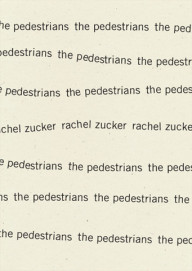 Rachel Zucker
Rachel Zucker
Wave Books ($18)
by Geula Geurts
Rachel Zucker's ninth book of poetry, The Pedestrians, is really a double collection, as it’s divided into two sections: “Fables” and “The Pedestrians.” Both sections form a cohesive whole that resonates like a mother's cry against the hustle and bustle of the New York City skyline. “Fables” leaves the city and seeks solitude in nature, whereas “The Pedestrians” delves into the turbulent bowels of the metropolis. Zucker makes a distinction between nature and city, but throughout she blurs lines between the two, as well as between animal nature and humanity, solitude and chaotic motherhood: all blend into one female howl of day-to-day survival.
Written in third-person narrative prose, “Fables” moves like a lost tourist meditating on place and nature. Focusing on a tired mother and housewife, Zucker skillfully creates a character with an emotionally detached voice, echoing the woman's attempt to detach herself from motherly duties and city life. Hungry for affection and serenity, the woman goes on holiday with her family, but experiences nothing of the expected relief:
She lay next to the snoring husband in the sublet bed and . . . the bedroom smelled like smoke and the wooden floors of the bathroom smelled like her three sons' urine . . . she realized that this city, so unlike her city, was exactly like her city and that everyone in her city was exactly like everyone in this city and that they were all animals and that animals can only be animals.
Zucker's boldness allows for honest encounters with raw marriage and motherhood:
She had a small copper wire inside her. . . . Without the chance of another child, sex lost some of its appeal, purposefulness, danger, pleasure . . .
"We're animals," he says, happily after sex.
"No," she thinks. Not anymore.
When the woman returns to her native city, which has transformed into an animal: "bridges curve like snakes," buses and trucks look like "chummy canines," buildings have bowels. The woman seems incapable of separating the blurred boundaries of nature and city life. Likewise, she can't ever really detach herself from her family, try as she might. “Fables” ends with this realization:
It's never safe to stay, she wanted to say. There is no such thing as leaving. . . .
There was no going away. Wherever she went they were with her.
In “The Pedestrians,” Zucker zooms in on the mother's busy life and creates poetic gems that echo her overwhelming day-to-day experience. The first-person narrative poems here create an intimacy with the speaker and her anxieties. In "mindful" we see Zucker's talent of connecting form with meaning; the poetic lines are mostly enjambed, which speeds up the tempo and creates a dizzying effect. Without a break between the lines, we feel out of breath, like the exhausted mother does:
want to ask why is this life so run-
run-run long underground train then crosstown bus
that is my son w/his 50 small feet kicking screaming
Too slow bus!
. . . . . . . . . . . . . . . . . . . .
I've forgotten to oh! left my urgh!
meat in the freezer or oven on so what? don't
make dinner? ha ha who will? the military?
The poem "pedestrian" verbalizes the mother's fear of losing her humanity in a city that is slowly transforming her into a surviving animal:
taking the shuttle at Times Square during rush hour
causes me serious distress a human tsunami perhaps
we deserve a large-scale population reduction
it seems inevitable I'm dehumanized by NY & my
proximity to others fatal loneliness of crowds
Poetry itself seems to be the mother's only comfort; she knows "reading and writing creates a private sphere /in a way that thinking can't." In "i'd like a little flashlight" she is able to express her deepest desires:
& I'd like to get naked & into bed & be
HOT radiating heat from the inside . . .
. . . . . . . . . . . . . . . . . . . . . . . . . . . . . . . . . .
I'd like a little flashlight to write poems w/this lousy day
not this poem I'm writing under the mostly flat
blaze of bulb but a poem written w/the light itself
a tiny fleeting love poem to life a poem that says
Look here a bright spot of life oh look another!
Zucker’s collection of poetry bears testimony to both her poetic brilliance and motherly ability to "juggle her family like eggs or oranges." Her hybrid style blends prose and verve into one urban stream, rendering her poems “worth their weight in ink” (as she puts in in “pedestrian”). Her words reverberate like the roar of an empowered lioness, as she emerges victoriously from the city jungle of her life, a mentor to all mothers.

